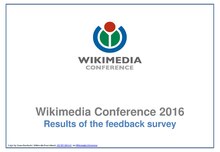Wikimedia Conference 2016/Feedback evaluation
Appearance

Results of the feedback survey
[edit]tl;dr: you can find the #wmcon survey evaluation (PDF) (2,1 MB) on Wikimedia Commons.
Methodology
[edit]- Online feedback survey via Qualtrics
- Questionnnaire on Wikimedia Commons
- Data collection:
- April 24th – May 6th 2016 (after closing of Wikimedia Conference 2016)
- Conference participants: 202
- Participants invited to the survey (via email): 194 / Two reminder emails
- Completed questionnaires: n=128 (63% of conference participants; 2015 survey: 67% of participants, 2014 survey: 53 % of participants)
Summary
[edit]
Background of participants
[edit]- This year’s participants tended to be slightly younger and somewhat newer to the movement (29% being three or less years involved with the movement vs. 23% in 2015).
- As in 2014, there was a large proportion of first time participants (2016: 45%, 2015: 32%, 2014: 49%). On the other hand, at least 54% of the 2016 participants have also attended the 2015 conference.
- The proportion of female participants marginally increased (2016: 31% vs. 2015: 29%).
- Like in 2015, due to the eligibility criteria and the rising number of User Groups, there also was a further increase in representatives of User Groups at the conference (2016: 20%, 2015: 12%).
Looking back
[edit]- 86% of the respondents who attended both WMCON15 and WMCON16 experienced tangible outcomes of the 2015 conference for their Wikimedia work (32% “strongly agree”, 54% “agree”).
- 66% of these respondents stated also having pursued concrete initiatives they had joined or started in the aftermath of the 2015 conference. Most of the initiatives mentioned focused on engaging in movement policies/ movement relations, working on specific projects and new ideas, peer-to-peer support with other affiliates and regional cooperations.
Content / program
[edit]- The majority of the respondents judged the conference as an opportunity to exchange ideas with others (100% ‘agree’ or ‘strongly agree’), as providing useful information to them and their organization (97%), as making clear the significance of sharing and collaboration (95%) and as being suitable for their background and experience (96%).
- Although other items like ‘reaching a shared understanding of the future of our movement’ and ‘clearly defined next steps and documented outcomes’ scored a bit lower, there are significant improvements in these aspects if compared to the 2015 survey results.
- Overall, the satisfaction with different program facets was slightly higher than in 2015. For example, the overall flow of the conference (97%, ‘very satisfied’ or ‘satisfied’), the conference facilitation (97%) and the composition of the audience (95%) received very good ratings.
- If compared to 2015, the overall scope and selection of topics was rated significantly higher than in last year’s survey (Mean value: 3.30 vs. 3.05 in 2015).
- Although slightly improved compared to 2015 (2016: 71%; 2015: 62%), a clear call to action/ definition of next steps is still missing for roughly a third of the respondents.
- Further remarks on program and content in general have been very diverse, though predominately positive. Some critical comments referred to the session formats/ program schedule, the content of the tracks and insufficient differentiation between new and more experienced participants.
Networking
[edit]- Getting in contact with other Wikimedians and affiliates is one major benefit of the Wikimedia conference. In terms of networking, 27% of the respondents reported making up to ten new working contacts and 36% reported 11-20 new working contacts. 36% of the participants made even more than twenty new working contacts.
- Meeting all the Wikimedia people at the conference mainly helped to gain knowledge (99%, ‘strongly agree’ or ‘agree’), share knowledge (99%), make new friends (97%) and to achieve a better understanding of each others views (94%). At least 85% felt supported to join or start an initiative.
- Overall, the 2016 ratings in terms of networking showed now significant differences to the 2015 conference survey results.
Organizational aspects
[edit]- As in 2015, the organizational aspects of the 2016 conference received very good ratings: especially the support by the WMCON logistics team during (100% ‘excellent’ or ‘good’) and before the conference (99%) or their help with visa formalities (95%) were highlighted. Also perceived very positively: the overall atmosphere at the conference (99% ‘excellent’ or ‘good’).
- Overall, no major (or significant) differences occurred between the 2015 and the 2016 evaluation of the organizational aspects, as some of the values seem to have reached their ceiling levels.
- In the open comments, positive remarks clearly dominated. Some critical remarks referred to the Wi-fi coverage and the conference food. Rather rarely: critical comments about the concept of the Saturday party, the accommodation and the general composition of the audience.
Overall Evaluation
[edit]- Learning from the organizational profile the affiliates filled out prior to the conference: participating organizations mainly expected connecting & networking, sharing of experiences and learning as main conference benefits. Networking and learning were also stated as main benefits after the conference (Networking, new contacts: 64% / learning: 39%).
- On the one hand, sharing of experiences was less prominent at the conference than expected before (prior: 44% / post: 22%). On the other hand, understanding the movement a bit better was mentioned more frequently as before (prior: 20% / post: 27% of mentions).
- Expectations were more frequently exceeded as in 2015: 44% of the respondents stated that their expectations regarding the conference were even exceeded (2015: 24%). 48% perceived their expectations as entirely met (2015: 58%). Only 8% stated that their expectations were not entirely met (2015: 17%).
- Finally, the conference received an even better overall rating as in 2015 and 2014: 67% ‘excellent’, 32% ‘good’ (2015: 57% ‘excellent’ and 40% ‘good’)
Detailed survey evaluation
[edit]- You can find the detailed survey evaluation as a pdf file (2,1 MB) on Wikimedia Commons.
